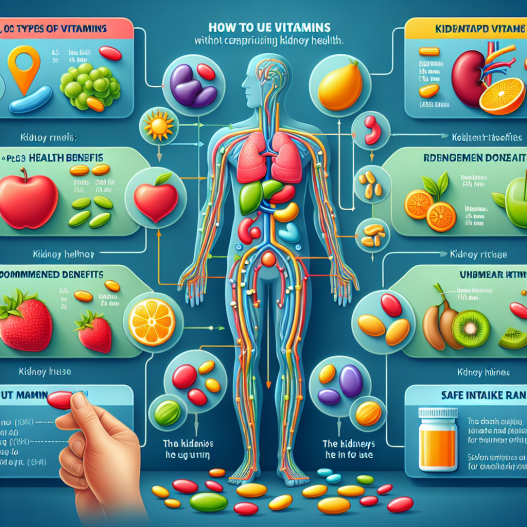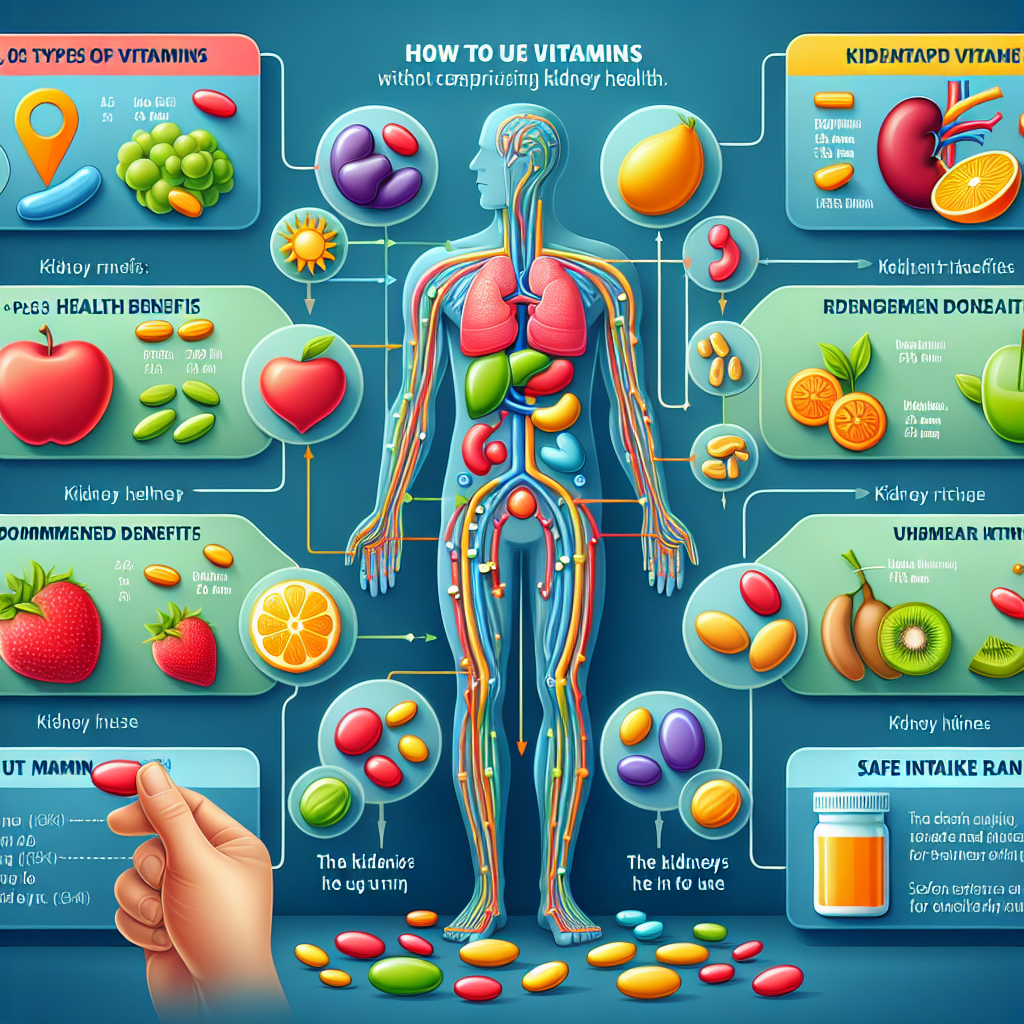-
Table of Contents
«Boost your health with Vitamines – kidney-friendly options available!»
Introduction
Vitamins are essential for maintaining a healthy body and supporting various bodily functions. However, for individuals with compromised kidney function, it is important to be cautious when taking vitamins. In this article, we will discuss how to use vitamins without compromising kidney health.
The Importance of Consulting with a Doctor Before Taking Vitamins for Renal Health
Vitamins are essential for maintaining good health and preventing various diseases. They play a crucial role in supporting the proper functioning of our body, including our kidneys. However, for individuals with renal health issues, taking vitamins without proper guidance and consultation with a doctor can be risky. It is essential to understand the potential risks and benefits of vitamins for renal health and consult with a doctor before incorporating them into your daily routine.
The kidneys are responsible for filtering waste products from the blood and maintaining the body’s fluid balance. They also play a vital role in regulating blood pressure and producing hormones that help in the production of red blood cells. When the kidneys are not functioning correctly, it can lead to various health problems, including anemia, high blood pressure, and bone disease. Therefore, it is crucial to take care of our kidneys and ensure their proper functioning.
Many people turn to vitamins and supplements to improve their overall health and prevent diseases. However, for individuals with renal health issues, it is essential to consult with a doctor before taking any vitamins or supplements. The reason being, certain vitamins and minerals can have adverse effects on the kidneys and worsen their condition.
One of the most common vitamins that can be harmful to the kidneys is vitamin C. While vitamin C is essential for boosting the immune system and promoting wound healing, it can also increase the risk of kidney stones. Vitamin C is a water-soluble vitamin, which means that excess amounts are excreted through the urine. However, when taken in high doses, it can lead to the formation of oxalate, a compound that can contribute to the development of kidney stones. Therefore, individuals with renal health issues should consult with a doctor before taking vitamin C supplements.
Another vitamin that can be harmful to the kidneys is vitamin D. Vitamin D is essential for maintaining strong bones and teeth and regulating calcium levels in the body. However, too much vitamin D can lead to an increase in calcium levels in the blood, which can cause kidney stones and damage to the kidneys. Individuals with renal health issues should consult with a doctor to determine the right dosage of vitamin D supplements to avoid any potential harm to their kidneys.
Apart from vitamins, certain herbal supplements can also have adverse effects on the kidneys. For example, herbal supplements like St. John’s Wort and Echinacea can interact with medications used to treat kidney disease and cause further damage to the kidneys. Therefore, it is crucial to consult with a doctor before taking any herbal supplements, especially if you have renal health issues.
Consulting with a doctor before taking vitamins and supplements for renal health is crucial because they can assess your overall health and determine the right dosage and type of vitamins that are safe for you. They can also monitor your kidney function and make necessary adjustments to your vitamin intake if needed. Additionally, they can also advise you on any potential interactions between vitamins and medications you may be taking for your renal health.
In conclusion, while vitamins and supplements can be beneficial for maintaining good health, it is essential to consult with a doctor before taking them, especially if you have renal health issues. Certain vitamins and supplements can have adverse effects on the kidneys and worsen their condition. Therefore, it is crucial to seek professional guidance and ensure the safety and effectiveness of any vitamins or supplements you plan to incorporate into your daily routine. Remember, your health is a priority, and consulting with a doctor is the best way to ensure that you are taking care of your kidneys while also reaping the benefits of vitamins for your overall health.
Understanding the Different Types of Vitamins and Their Effects on the Kidneys
Vitamins are essential nutrients that our bodies need to function properly. They play a crucial role in maintaining our overall health and well-being. However, for those with compromised kidney function, taking vitamins can be a tricky task. The kidneys are responsible for filtering out waste and excess nutrients from the blood, and any imbalance in vitamin intake can put a strain on these vital organs. In this article, we will discuss the different types of vitamins and their effects on the kidneys, as well as provide tips on how to use vitamins without compromising kidney health.
Firstly, it is important to understand that there are two types of vitamins: water-soluble and fat-soluble. Water-soluble vitamins, such as vitamin C and B-complex vitamins, dissolve in water and are not stored in the body. This means that any excess amounts are excreted through urine, making it less likely to cause harm to the kidneys. On the other hand, fat-soluble vitamins, such as vitamins A, D, E, and K, are stored in the body’s fat tissues and can build up to toxic levels if taken in excess. This can put a strain on the kidneys, as they are responsible for filtering out these vitamins from the blood.
One of the most common vitamins that can have a negative impact on kidney health is vitamin C. While this vitamin is essential for a strong immune system and healthy skin, excessive intake can lead to the formation of kidney stones. This is because vitamin C is converted into oxalate, a compound that can bind with calcium and form stones in the kidneys. Therefore, it is important to limit vitamin C intake to the recommended daily allowance (RDA) of 90 mg for men and 75 mg for women.
Another vitamin that can have adverse effects on the kidneys is vitamin D. This vitamin is crucial for maintaining strong bones and teeth, but excessive intake can lead to high levels of calcium in the blood, known as hypercalcemia. This can cause damage to the kidneys and increase the risk of kidney stones. It is recommended to limit vitamin D intake to the RDA of 600-800 IU per day for adults.
In addition to these vitamins, excessive intake of vitamin A and E can also have negative effects on kidney health. Vitamin A is essential for maintaining healthy vision and skin, but too much of it can lead to liver and kidney damage. Similarly, high levels of vitamin E can cause kidney damage and increase the risk of bleeding. It is important to follow the RDA of 700-900 mcg for vitamin A and 15 mg for vitamin E to avoid any potential harm to the kidneys.
So, how can one use vitamins without compromising kidney health? The key is to follow the recommended daily allowances and avoid excessive intake. It is also important to consult with a healthcare professional before starting any vitamin supplements, especially if you have kidney disease or are at risk for it. They can help determine the right dosage and monitor your kidney function to ensure that the vitamins are not causing any harm.
Moreover, it is essential to choose high-quality supplements from reputable brands. This ensures that the vitamins are properly formulated and do not contain any harmful additives. It is also important to read the labels carefully and avoid supplements that contain excessive amounts of vitamins, as well as those that are not recommended for individuals with kidney disease.
In conclusion, vitamins are essential for our overall health, but for those with compromised kidney function, it is crucial to be mindful of their intake. Water-soluble vitamins are generally safe for the kidneys, while fat-soluble vitamins can cause harm if taken in excess. It is important to follow the recommended daily allowances and consult with a healthcare professional before starting any vitamin supplements. By being mindful of our vitamin intake, we can ensure that we are not compromising our kidney health.
Tips for Safely Incorporating Vitamins into Your Renal Health Routine
Vitamins are essential for maintaining good health and preventing various diseases. However, for those with compromised renal health, incorporating vitamins into their daily routine can be a challenge. The kidneys play a crucial role in filtering out excess vitamins and minerals from the body, and any imbalance can put additional strain on these vital organs. Therefore, it is essential to use vitamins carefully and with caution to avoid any adverse effects on the kidneys.
The first step in safely incorporating vitamins into your renal health routine is to consult with your healthcare provider. They can assess your current renal function and provide personalized recommendations for vitamin intake. Your doctor may also suggest specific vitamins or supplements that are safe for your kidneys and can help improve your overall health.
When selecting vitamins, it is crucial to read the labels carefully. Look for products that are specifically labeled as «kidney-friendly» or «safe for renal health.» These vitamins are formulated with lower levels of minerals such as potassium and phosphorus, which can be harmful to those with kidney disease. It is also essential to avoid any supplements that contain herbs or other ingredients that may have a negative impact on renal function.
Another crucial aspect to consider is the dosage of vitamins. For those with renal impairment, it is essential to stick to the recommended daily allowance (RDA) for each vitamin. Taking higher doses can put additional strain on the kidneys and may lead to complications. It is also essential to spread out the intake of vitamins throughout the day, rather than taking them all at once. This allows the kidneys to process and filter out the vitamins more efficiently.
In addition to being mindful of the vitamins you take, it is also essential to pay attention to your overall diet. A balanced and healthy diet is crucial for maintaining good renal health. Incorporating a variety of fruits, vegetables, and whole grains can provide essential vitamins and minerals without putting too much strain on the kidneys. It is also essential to limit your intake of processed and packaged foods, which are often high in sodium, phosphorus, and other minerals that can be harmful to the kidneys.
If you are on dialysis, it is essential to be extra cautious when it comes to vitamins. Dialysis removes waste and excess fluids from the body, but it also removes essential vitamins and minerals. Therefore, it is crucial to work closely with your healthcare provider to determine the right dosage and type of vitamins to take. They may also recommend taking vitamins at specific times, such as after dialysis, to ensure proper absorption.
In addition to vitamins, it is also essential to pay attention to your fluid intake. For those with renal impairment, it is crucial to limit your fluid intake to avoid putting additional strain on the kidneys. This includes not only water but also other fluids such as juices, soups, and even fruits and vegetables with high water content. Your healthcare provider can provide personalized recommendations for your fluid intake based on your specific condition.
In conclusion, incorporating vitamins into your renal health routine can be done safely with the right precautions. It is crucial to consult with your healthcare provider, read labels carefully, stick to recommended dosages, and maintain a balanced diet. By following these tips, you can reap the benefits of vitamins without compromising your renal health. Remember, your kidneys are vital organs, and it is essential to take care of them to maintain overall health and well-being.
Q&A
1. ¿Es seguro tomar vitaminas si tengo problemas renales?
Depende de la gravedad de los problemas renales y del tipo de vitaminas que se estén tomando. Algunas vitaminas pueden ser perjudiciales para la salud renal, por lo que es importante consultar con un médico antes de tomar cualquier suplemento vitamínico.
2. ¿Qué vitaminas son seguras para las personas con problemas renales?
Las vitaminas hidrosolubles, como la vitamina C y las del complejo B, son generalmente seguras para las personas con problemas renales. Sin embargo, es importante consultar con un médico antes de tomar cualquier suplemento, ya que pueden interactuar con los medicamentos o empeorar la condición renal.
3. ¿Cómo puedo asegurarme de que las vitaminas que tomo no afecten mi salud renal?
Es importante leer cuidadosamente las etiquetas de los suplementos vitamínicos y asegurarse de que no contengan ingredientes que puedan ser perjudiciales para la salud renal. También es recomendable consultar con un médico antes de tomar cualquier suplemento y hacerse pruebas regulares para monitorear la función renal.
















